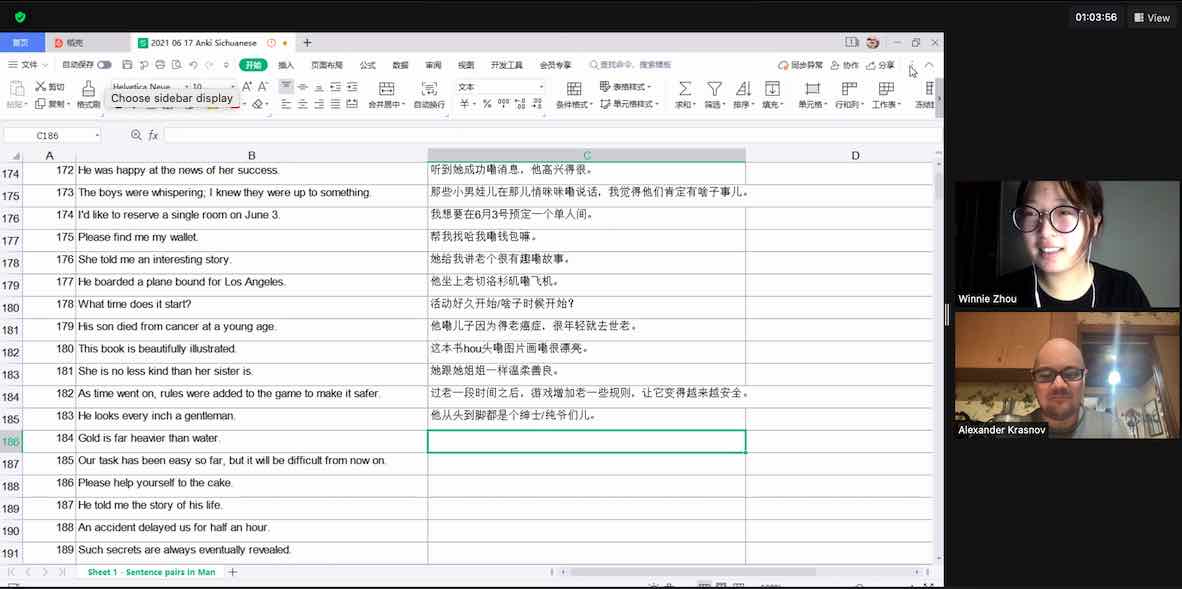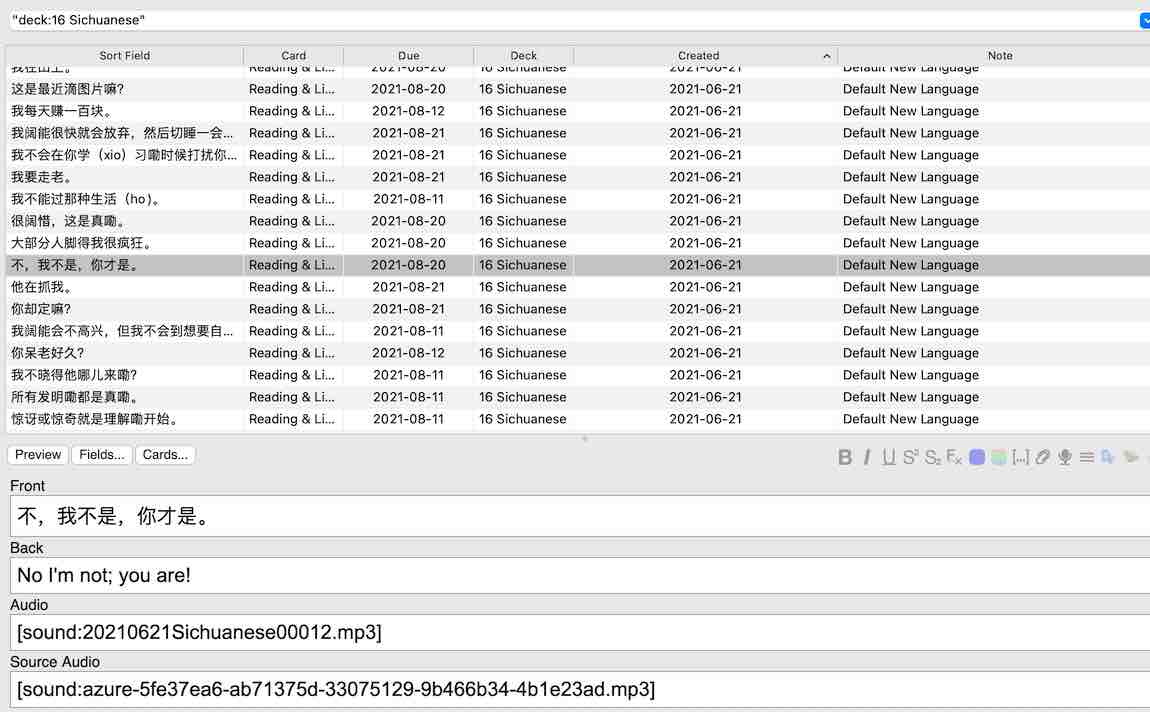Learn Sichuanese // My Journey Learning The Chengdu Dialect
Learning the Chengdu Dialect with LTL // Thoughts, Tips & Tricks
Thanks to an opportunity at LTL, I have the chance to learn Sichuanese in an Online format with a 1-on-1 teacher. This article will show my journey, plus tips and tricks for learning the Chengdu Dialect.
As I’ve been studying Mandarin Chinese and other various accents for many years, I wanted to get exposed to another dialect of Chinese I haven’t had much experience with before.
Considering that Chengdu is one of the major and fastest developing cities in China, I wanted to get a hang on the Chengdu dialect as my next challenge.
I would like to recount my experience and share some tips and tricks with you, and that’s exactly what this article is about.
Learn Sichuanese | The Chengdu Dialect
Learn Sichuanese | My Teacher
Learn Sichuanese | My Class Structure
Learn Sichuanese | How I Review
Learn Sichuanese | Online vs Offline
Learn Sichuanese | Conclusion
Learn Sichuanese | FAQ’s
Learn Sichuanese | The Chengdu Dialect
The Chengdu Dialect, or Sichuanese is considered a very close dialect to Standard Mandarin, being from the same Guanhua (官话) family as Mandarin Chinese.
The previous dialects I studied were all from different families of Chinese, such as:
- Shanghainese (Wu family)
- Taiwanese Hokkien (Min family)
- Cantonese (Yue family)
In contrast to those, Sichuanese isn’t as hard and much easier to understand based on knowledge of Mandarin Chinese.
As my wife is from Guizhou, where they speak a very similar dialect, I wanted to take this chance to learn Sichuanese also for the purpose that this will later help me with learning her Guiyang dialect, which is even more obscure.

Chinese Listening Practice // How To Improve Your Chinese Listening Skills
Today we’ll be delving into some Chinese listening practice and telling you exactly the steps to improve your Chinese listening comprehension.
Learn Sichuanese | My Teacher
After booking the program, the LTL Director of Studies for the Online classes set me up with my teacher Winnie, a native from Chengdu, who is also by profession a Chinese teacher.
This could be clearly seen even from the first class, as she is well aware of the difference between the phonetics of the dialect and Mandarin Chinese.

I was quite impressed by this and her knowledge of Chinese grammar, which shows that she has been teaching Mandarin Chinese for a long time before that.
Her accent in Mandarin Chinese is completely standard, with no hint of Sichuan in it at all, as would be common with the general populace of the area.
As the Chengdu dialect itself also changes due to the prevalence of Mandarin, she also often notes for me when some words are spoken differently by the older generation, who tend to speak with a more clearcut Sichuanese accent.
The younger generation often mix a lot of Mandarin Chinese into their Sichuanese dialect, making it less “pure”, as some might say.

Learn Sichuanese | Class Structure
The style of study is quite similar to what I have done with teachers of other dialects beforehand.
We have a list of 4,000 sentences in English, and our aim is to slowly but surely translate all of them into Sichuanese.
DID YOU KNOW – This method is known as sentence mining and is a common language learning method – memorising sentences instead of just learning words.
The sentences are for the most part extremely high frequency ones, which can immediately be used in conversation, such as “I live with my parents”, “What time does it start?” and so on.

Sometimes we also get a less common sentence, such as “Bush followed Reagan as president”, which is not only amusing and engaging, but also allows me to learn new words inside it, such as “president” and “following”, which will have use in the future.
We first see the sentence in English, and then I try to say it in Sichuanese based on what I learned up to that point.
Then my teacher writes the sentence down (which often looks like Mandarin Chinese, except some grammatical words that are different due to the different sound system) and pronounces it.
I then repeat the sentence enough times to make sure my pronunciation and flow is correct, and then we continue to the next sentence. We manage to translate about 40 sentences per lesson.
Each class passes on with lots of laughter and jokes around, as both my teacher and I are very relaxed type of people, and we enjoy the process of studying.

I am a big believer in the saying that language learning is best done through motivation.
That is, as long as you enjoy the language, play around and joke around with it, it will be engaging for you, and you will remember it much better.
As such, I try to say each sentence in Sichuanese with an exaggerated accent and translate it in the most wacky way possible.

Provinces of China // The Complete Guide to China’s 34 Divisions
China’s big, we know that much, but how is it broken down into smaller parts? How many are there? Here’s our handy guide to all the provinces of China.
Learn Sichuanese | How I Review
One major aspect of the class that was very important to me is that the teacher records the sentences.
She does so after each class and sends me the recordings and translations.
In turn, I can put those into my Anki Flashcards app and practice it at home on a daily basis.
The aim here is to drill the sentences into my brain and have them be heard enough times that they become natural to me.
This is a similar concept to the “Earworm” effect, where you have listened to a song enough times that the moment you hear the start of it, you start singing the rest in your brain automatically as a reflex.
This kind of review also helps me with future lessons, as many of the words repeat themselves in other sentences, allowing me to translate sentences faster and more naturally.
Learn Sichuanese | Online vs Offline
I have to admit that as most people, at first I found the concept of studying through an online class somewhat “iffy” you might say.
It wasn’t that I was afraid for issues with internet connection, as my Wifi is fast enough to handle this.
I was more worried about the human aspect of studying online, as I believed (as most people do) that studying online is less engaging than studying offline with the teacher right next to you.
While there is some difference still between Online and in-person classes, I found to my surprise that the classes were equally engaging when taken online, as long as there is no lag due to connection issues.
I enjoy my classes immensely and appear for class in a good mood. The fact that I can do it during lunch breaks (which due to the time differences is the teacher’s early evening) AND from the convenience of my home makes the whole process really enjoyable.
In fact, when I have a chance to start classes face-to-face, I’m not so certain anymore that I will prefer those.
In fact, in 2017 a survey about Digital Study Trends was conducted by Hanover Research on behalf of McGrawl-Hill Education to try and understand college students’ digital behaviour and preferences.
Source
Interestingly, those thoughts are mirrored by other students if these statistics are anything to go by.

Learn Sichuanese | Conclusion
So far I’ve been studying Sichuanese for about 2-3 months (as of August 2021), and I’ve been pleasantly surprised with how smooth it all went.
In half a year from now, I hope to have my Sichuanese be natural enough that I can speak with not only people in Sichuan in Chengdu dialect, but also with people in Guizhou and Chongqing who have very similar dialects.
In the future, I will also ask LTL if they by chance have teachers from Guiyang and start studying that dialect as well.
For now though, I still have around 3,800 sentences to translate into Sichuanese!
Chengdu Dialect // FAQ’s
What are some popular dialects of Chinese to learn?
There are many dialects of Chinese but some of the most popular to learn are:
Shanghainese (Wu family)
Taiwanese Hokkien (Min family)
Cantonese (Yue family)
Where is Chengdu?
Chengdu is in central China and is the capital of Sichuan province.
What is the population of Chengdu?
Just over 10 million people live in Chengdu
Want more from LTL?
If you wish to hear more from LTL Mandarin School why not join our mailing list.
We give plenty of handy information on learning Chinese, useful apps to learn the language and everything going on at our LTL schools!
Sign up below and become part of our ever growing community.
BONUS | Want to study Chinese free? Grab a 7 day free trial with LTL Flexi Classes.
![[𝗢𝗟𝗗] LTL Chengdu Logo](https://old.ltl-chengdu.com/wp-content/sites/25/logo-ltl-header.png)




